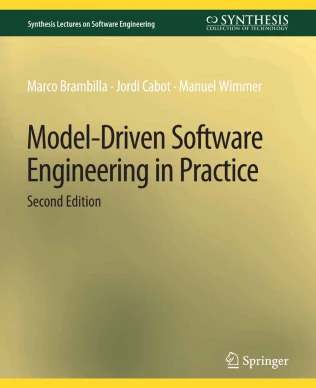Despite the increasing limitations for unvaccinated people, in many European countries, there is still a non-negligible fraction of individuals who refuse to get vaccinated against SARS-CoV-2, undermining governmental efforts to eradicate the virus. Within the PERISCOPE project, we studied the role of online social media in influencing individuals' opinions about getting vaccinated by designing a … Continue reading The VaccinEU dataset of COVID-19 Vaccine Conversations on Twitter in French, German, and Italian
Blog
Model Driven Software Engineering in Practice now published by Springer Nature
Starting June 2022, our book "Model Driven Software Engineering in Practice" (co-authored with Jordi Cabot and Manuel Wimmer) is now also available via Springer . This means the price is actually lower, and if you are affiliated with an academic institution, you may even have free access to the book through your institutional access. Check it out here. … Continue reading Model Driven Software Engineering in Practice now published by Springer Nature
EXP-Crowd: Gamified Crowdsourcing for AI Explainability
The spread of AI and black-box machine learning models makes it necessary to explain their behavior. Consequently, the research field of Explainable AI was born. The main objective of an Explainable AI system is to be understood by a human as the final beneficiary of the model. In our research we just published on Frontiers … Continue reading EXP-Crowd: Gamified Crowdsourcing for AI Explainability
The Final TRIGGER Conference
We will join and contribute to the final TRIGGER conference is scheduled for May 31st, 2022 in Brussels. The theme is: "Rethinking the EU’s role in global governance". In this context, the TRIGGER project is going to present the main research outcomes of the H2020 research program that started in 2018, setting the stage for the collaboration … Continue reading The Final TRIGGER Conference
Analysis of Online Reviews for Evaluating the Quality of Cultural Tourism
we explored if social media and online review platforms can be a good source of quantitative evaluation of service quality of cultural venues, such as museums, theaters and so on.
A Model-Driven Approach for Multi-experience Development Platforms
Our recent research tackles the application of model-driven techniques to the development of software applications embedding a multiexperience UI.
Large-Scale Analysis of On-line Conversation about Vaccines before COVID-19
Frequent words and co-occurrences used by pro-vaccination and anti-vaccination communities. In this study, we map the Twitter discourse around vaccinations in English along four years, in order to: discover the volumes and trends of the conversation; compare the discussion on Twitter with newspapers’ content; and classify people as pro- or anti- vaccination and explore how … Continue reading Large-Scale Analysis of On-line Conversation about Vaccines before COVID-19
Call for good practices proven effective in the management and containment of the COVID-19 pandemic effects on economy, society, and healthcare
PERISCOPE (“Pan-European Response to the Impacts of COVID-19 and future Pandemics and Epidemics”) is a large-scale project that aims at mapping and analysing the impacts of the COVID-19 pandemic, developing solutions and guidance for policymakers and health authorities on how to mitigate the impact of the pandemic, and enhancing Europe’s preparedness for future similar events. We … Continue reading Call for good practices proven effective in the management and containment of the COVID-19 pandemic effects on economy, society, and healthcare
PERISCOPE: the EU project on socio-economic and behavioral impacts of the COVID-19 pandemic
Starting today, our team at the Data Science Lab Polimi will participate to the PERISCOPE European project. PERISCOPE will investigate the broad socio-economic and behavioral impacts of the COVID-19 pandemic, to make Europe more resilient and prepared for future large-scale risks. The European Commission approved PERISCOPE (PAN-EUROPEAN RESPONSE TO THE IMPACTS OF COVID-19 AND FUTURE … Continue reading PERISCOPE: the EU project on socio-economic and behavioral impacts of the COVID-19 pandemic
Generation of Realistic Navigation Paths for Web Site Testing using RNNs and GANs
we propose a method that focuses on the generation of REALISTIC NAVIGATIONAL PATHS, i.e., web logs. Our approach is extremely relevant because it can at the same time tackle the problem of lack of publicly available data about web navigation logs, and also be adopted in industry for AUTOMATIC GENERATION OF REALISTIC TEST SETTINGS of Web sites yet to be deployed.






